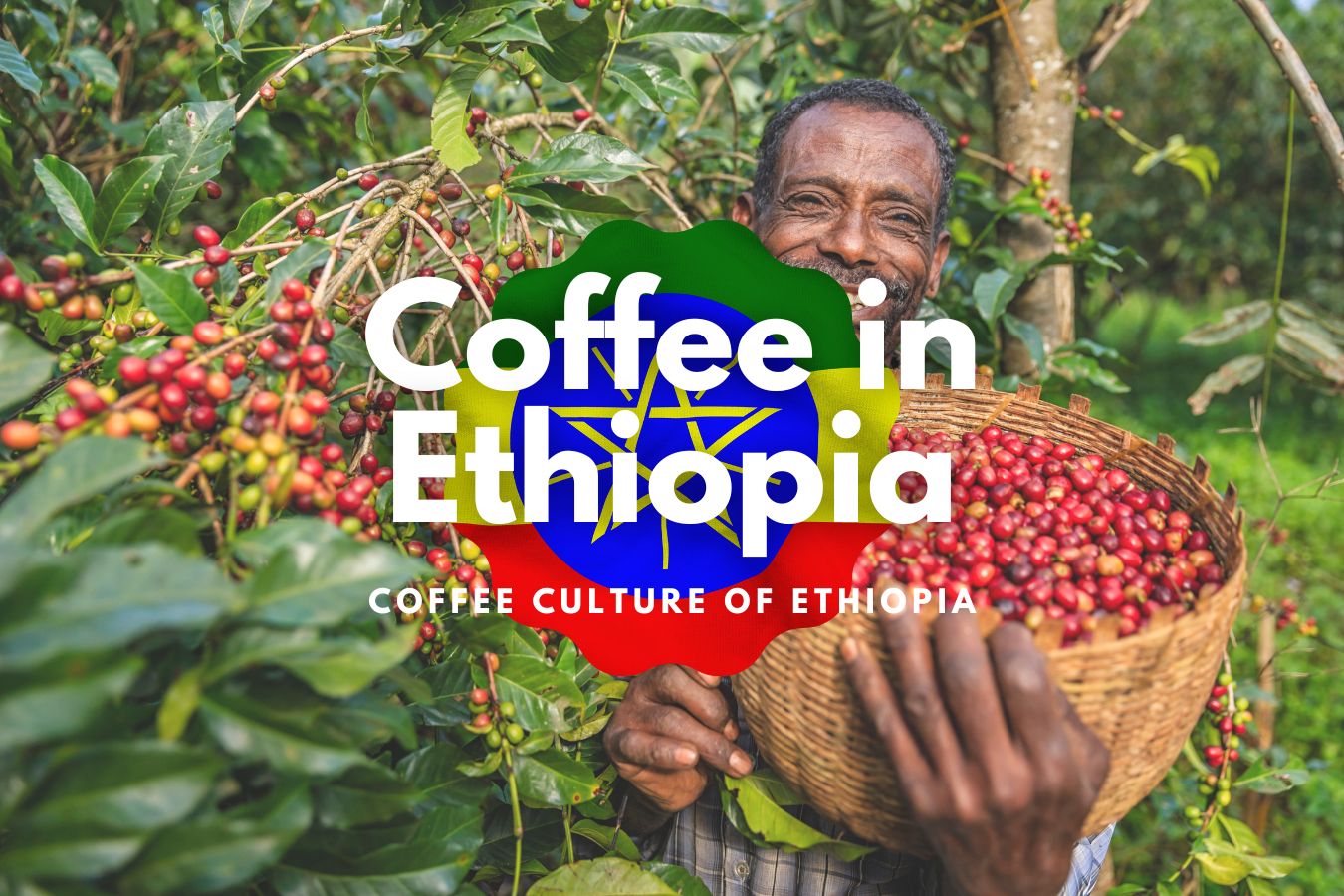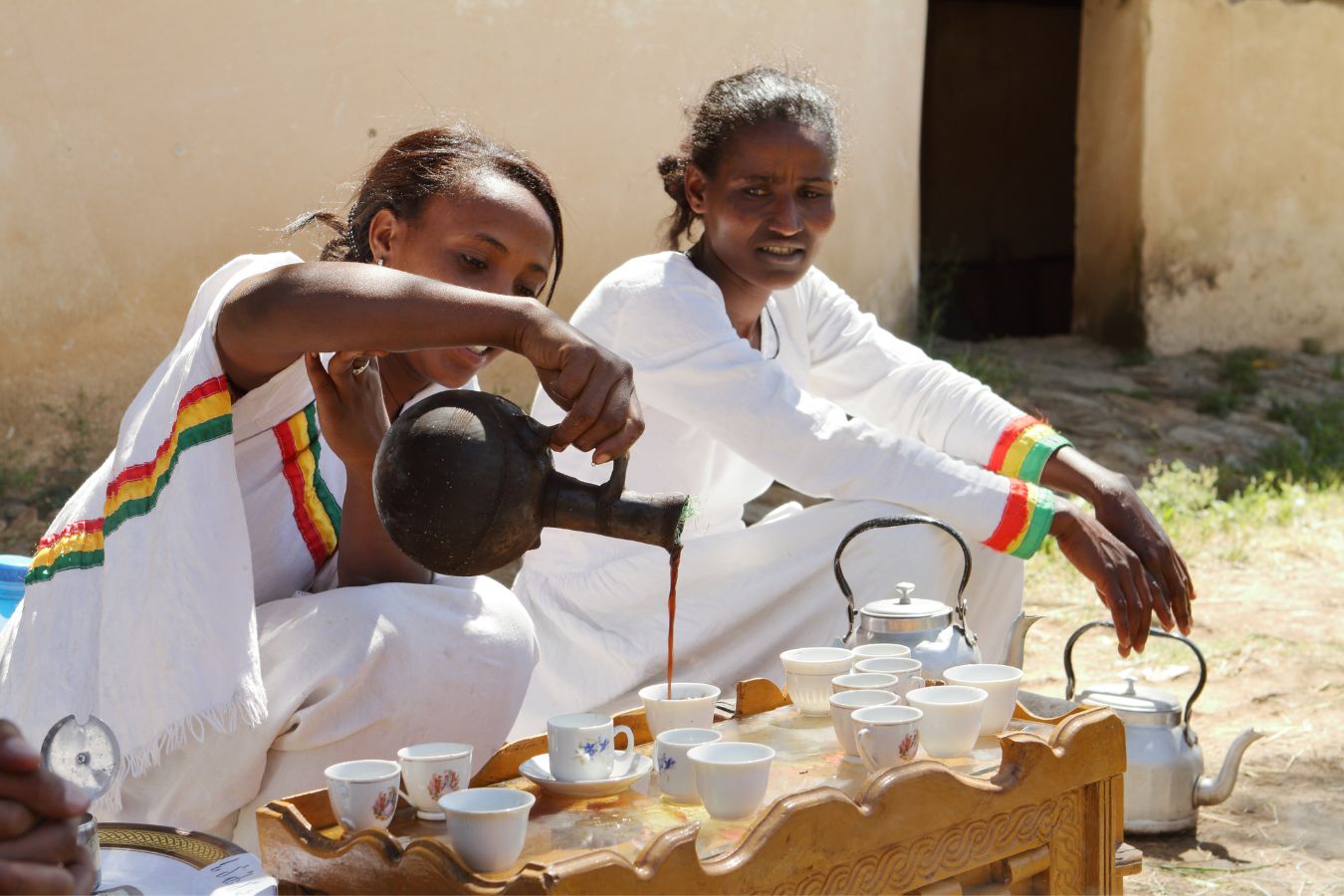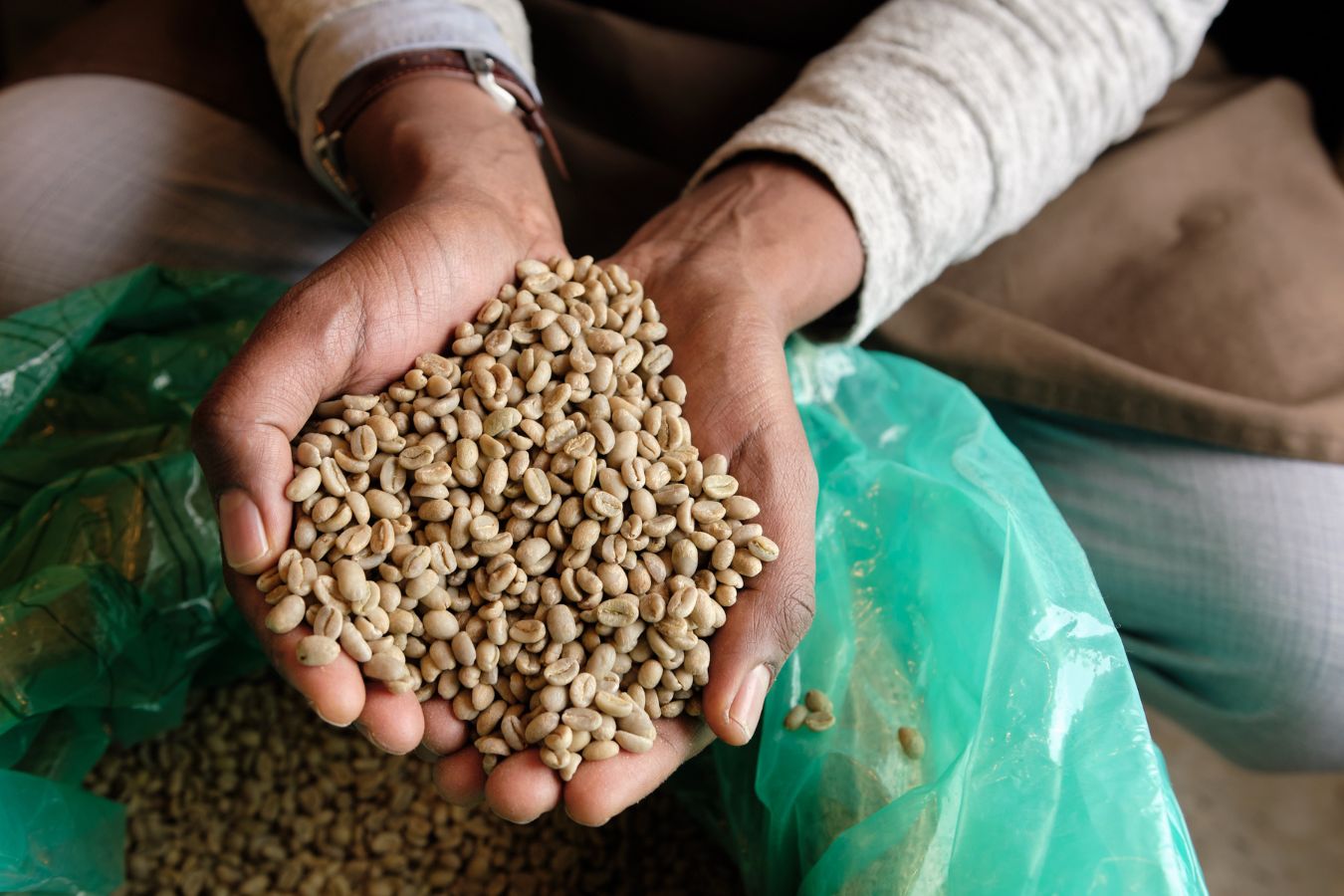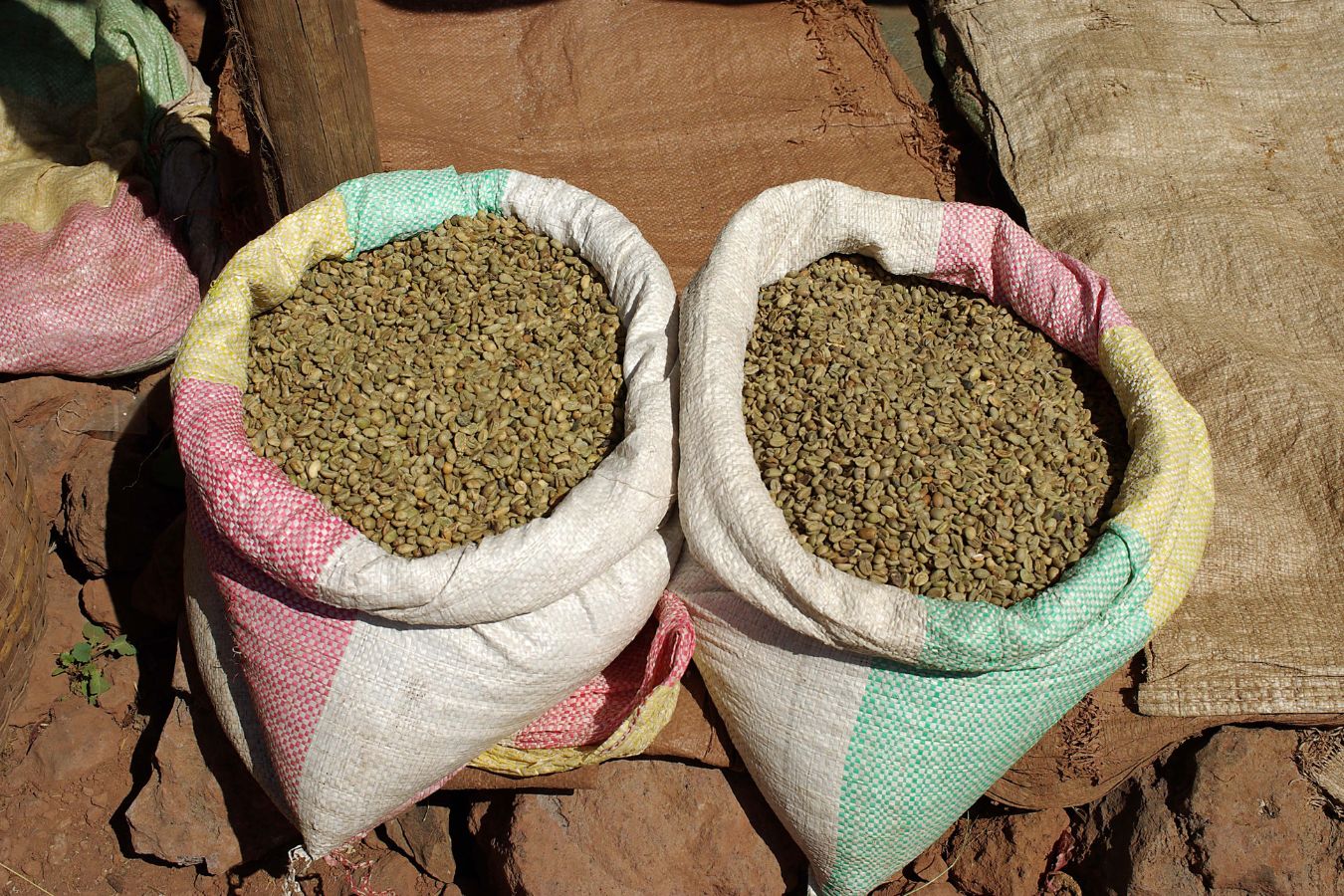
Coffee in Ethiopia: Ethiopia is widely considered the birthplace of coffee, and its coffee culture is deeply rooted in the country’s history and traditions. The country produces some of the world’s most flavorful and unique coffee beans, with distinct regional variations in flavor and aroma. Coffee plays a significant role in Ethiopian culture, with traditional coffee ceremonies being an important social activity.
Ethiopia’s coffee industry is a vital part of the country’s economy, supporting the livelihoods of millions of people across the country.
Overview of Ethiopian Coffee
Ethiopia is widely regarded as the birthplace of coffee, with a long and rich history of coffee cultivation and consumption. According to legend, a goat herder named Kaldi first discovered the stimulating effects of coffee when he noticed his goats becoming energized after eating the berries of a particular tree.
From there, the cultivation of coffee spread throughout the country, with Ethiopia now producing a variety of high-quality coffee beans, including Harrar, Sidamo, and Yirgacheffe. Coffee is an integral part of Ethiopian culture, with the traditional coffee ceremony being a significant social event steeped in tradition and hospitality.
Ethiopia’s Coffee Regions: A Journey Through the World of Flavor
Thanks to its diverse coffee-growing regions, Ethiopia is renowned for producing some of the world’s finest coffee, which offers unique flavor profiles. From the sweet and floral notes of Yirgacheffe to the fruity and wine-like qualities of Sidamo, each region has something special to offer coffee enthusiasts.
Sidamo, located in the southern part of the country, is one of the largest coffee-growing regions in Ethiopia. Its coffee beans are known for their distinctively fruity and wine-like taste, attributed to the region’s high altitudes and natural shade from indigenous trees.
On the other hand, Harrar is located in eastern Ethiopia and is known for its dry-processed coffee, giving it a unique blueberry flavor. This region’s coffee is grown at high altitudes, contributing to its bold and complex flavors.

Yirgacheffe, located in the southern part of the country, is coffee’s birthplace. Its beans are highly prized for their sweet and floral notes, attributed to the region’s unique processing methods. Coffee from this region is grown under the canopy of indigenous trees, which provides natural shade and contributes to its distinct flavor profile.
In addition to their unique flavors, each region has its cultural significance. For example, the Sidamo region is home to the Sidama people, who have a long history of coffee production and have developed their traditional coffee ceremony.
Ethiopia’s coffee regions offer diverse flavors and cultural experiences, making it a must-visit destination for coffee lovers worldwide.
Coffee Farming in Ethiopia
Ethiopia is known as the birthplace of coffee, and the country’s coffee industry is deeply rooted in its culture and economy. Smallholder farmers comprise most of Ethiopia’s coffee producers, many of whom have been cultivating coffee for generations. However, these farmers face numerous challenges that threaten their livelihoods and the quality of their coffee.
One of the biggest challenges facing Ethiopian coffee farmers is climate change. Changes in temperature and rainfall patterns have led to irregular growing seasons and increased incidences of pests and diseases. This has made it harder for farmers to predict when to plant and harvest their coffee, resulting in lower yields and poorer quality coffee.
Political instability is another challenge for Ethiopian coffee farmers. The country has experienced periods of conflict and unrest, which can disrupt the coffee supply chain and make it harder for farmers to access markets and resources. In addition, government policies and regulations can be inconsistent or unclear, making it harder for farmers to plan for the future and invest in their farms.
Despite these challenges, Ethiopian coffee farmers are working to improve their production methods and protect their crops. Many are adopting sustainable farming practices, such as intercropping and agroforestry, to improve soil health and reduce the need for pesticides. Some are also experimenting with new coffee varieties and processing methods to create unique flavors and increase their income.
Ethiopia’s coffee industry’s success depends on its smallholder farmers’ well-being. By supporting these farmers and addressing their challenges, Ethiopia can continue to produce some of the world’s finest coffees while improving the livelihoods of its rural communities.
Ethiopian coffee culture
Ethiopia is widely regarded as the birthplace of coffee, and the country has a long and rich history of coffee culture. Here are some critical aspects of Ethiopian coffee culture:
Coffee ceremony in Ethiopia:
In Ethiopia, the coffee ceremony is a formal process deeply ingrained in the culture. It’s a social event that typically takes place in the afternoon or evening, and it involves roasting, grinding, and brewing coffee beans in front of guests.
The ceremony is led by a host who serves as a master of ceremonies. They begin by washing the coffee beans and roasting them over an open flame. The roasted beans are then ground by hand using a mortar and pestle, and the resulting coffee powder is brewed in a unique pot called a jebena. The host then serves the coffee to the guests, often along with traditional snacks like popcorn or roasted barley.
Traditional Ethiopian coffee recipes:
There are several traditional Ethiopian coffee recipes, some of which are unique to specific regions or ethnic groups. One popular recipe is buna, made by mixing coffee with butter and salt. Another recipe, called macchiato, involves adding a small amount of milk and sugar to the coffee.

Coffee shops and cafes in Ethiopia:
In recent years, coffee shops and cafes have become increasingly popular in Ethiopia, particularly in the capital city of Addis Ababa. These establishments offer a modern take on traditional Ethiopian coffee culture, with various coffee drinks and snacks available. Many coffee shops also feature live music or other forms of entertainment.
Ethiopian coffee culture is a vibrant and vital part of the country’s heritage. From the traditional coffee ceremony to modern coffee shops and cafes, coffee is a central part of daily life in Ethiopia.
The Economics of Coffee in Ethiopia
The coffee industry is a vital part of Ethiopia’s economy and plays a significant role in the country’s social and cultural fabric. Here are some key economic aspects of coffee in Ethiopia:
The importance of coffee to Ethiopia’s economy:
Coffee is Ethiopia’s most important export crop, accounting for a significant portion of the country’s GDP. According to the International Coffee Organization, Ethiopia is the fifth-largest coffee producer in the world, with over 400,000 coffee farms and an estimated 15 million people involved in coffee production.
Coffee trade in Ethiopia:
The Ethiopian government controls the country’s coffee trade through a central auction system, where coffee beans are sold to international buyers. This system ensures that coffee farmers receive a fair price for their beans and maintain Ethiopian coffee’s quality on the global market.
The future of coffee production in Ethiopia:
The coffee industry in Ethiopia faces several challenges, including climate change, plant diseases, and market competition from other coffee-producing countries. However, the Ethiopian government addresses these issues through initiatives such as sustainable coffee production and increased investment in coffee research and development.
One promising development in the coffee industry is the rise of specialty coffee, which is produced in small quantities and often sold at higher prices. Ethiopian coffee is well-suited for the specialty market due to its unique flavor profile and cultural significance.

In conclusion, coffee is integral to Ethiopia’s economy, culture, and identity. As the country faces new challenges in the global market, it will be essential to continue investing in sustainable coffee production and promoting Ethiopia’s rich coffee heritage.
The impact of Ethiopian coffee on the world
Ethiopia is renowned for producing high-quality coffee with unique and distinctive flavors. Here are some ways in which Ethiopian coffee has impacted the global coffee industry:
Ethiopian Coffee’s Influence on the global coffee market:
Ethiopia is often considered the birthplace of coffee, and its influence on the worldwide coffee market cannot be understated. Ethiopian coffee is renowned for its diverse and distinctive flavor profiles, rich history, and cultural importance. Here are some ways Ethiopian coffee has impacted the global coffee market:
Unique Flavor Profiles
Ethiopian coffee boasts many flavors, from fruity and floral notes to earthy and spicy undertones. This diversity is attributed to the country’s varied microclimates, soil conditions, and coffee processing methods. The unique flavors have made Ethiopian coffee a favorite among coffee enthusiasts, leading to its increasing demand worldwide.
Birthplace of Arabica Coffee
Ethiopia is home to the Coffea arabica plant, the most widely consumed coffee species globally. The discovery of coffee in Ethiopia laid the foundation for the coffee culture that spans the globe. Today, Arabica beans account for around 60-70% of the world’s coffee production, and Ethiopian varieties continue to be highly valued.
Cultural Significance
Ethiopian coffee has a rich cultural heritage, with coffee ceremonies an essential aspect of Ethiopian social life. These ceremonies have gained international recognition, highlighting the importance of coffee in Ethiopian society and further solidifying the country’s status as a vital player in the global coffee market.
Specialty Coffee Market Growth
Ethiopian coffee has played a significant role in the growth of the specialty coffee market. It’s distinctive flavors and unique processing methods have attracted coffee connoisseurs seeking a premium coffee experience. In recent years, this has led to a surge in demand for high-quality, single-origin Ethiopian coffee beans.
Sustainable and Organic Production
Ethiopian coffee farmers practice traditional, environmentally friendly farming methods, often without chemicals. This focus on sustainable and organic products has made Ethiopian coffee an attractive choice for consumers who value ethical and eco-friendly practices in the coffee industry.
In conclusion, Ethiopian coffee has considerably influenced the global coffee market. Its unique flavors, rich cultural history, and sustainable production practices have helped it maintain a prominent position in the industry, driving demand for Ethiopian coffee beans worldwide.
Ethiopian coffee brands and their success stories:
Thanks to its diverse coffee-growing regions and unique coffee processing methods, Ethiopia has produced some of the world’s most renowned coffee brands. Here are three successful Ethiopian coffee brands that have made a significant impact on the global coffee market:
Yirgacheffe
Yirgacheffe coffee is named after the town in the southern region of Ethiopia where it is grown. It is considered one of the most sought-after coffees globally due to its bright acidity, complex flavor profile, and delicate floral notes. Yirgacheffe coffee is typically wet-processed, which helps to preserve its vibrant flavors and contributes to its clean, tea-like body.
Success Story: The Yirgacheffe brand has gained international recognition and is often featured in specialty coffee shops worldwide. Its high-quality, single-origin coffee reputation has allowed the Yirgacheffe region to become a key player in the global coffee market. The brand’s success has also created opportunities for local coffee farmers to improve their living conditions and invest in their communities.
Sidamo
Sidamo coffee originates from the Sidama region in southern Ethiopia. It is known for its medium body, balanced acidity, and fruity and citrusy flavor notes. Like Yirgacheffe, Sidamo coffee is often wet-processed, resulting in a clean and bright cup profile. Sidamo coffee is also available in different grades, with Grade 1 being the highest quality.
Success Story: Sidamo Coffee has succeeded in international markets, particularly among specialty coffee enthusiasts who appreciate its unique flavor. The brand’s global recognition has helped elevate the status of Ethiopian coffee, promoting the country’s rich coffee heritage and culture. As a result, Sidamo coffee has contributed to the growth of Ethiopia’s coffee export industry and improved the livelihoods of coffee farmers in the region.
Harrar
Harrar coffee comes from the eastern region of Ethiopia, known for its dry, arid climate. This coffee is characterized by its bold, entire body and complex flavors, including fruity, wine-like notes and a hint of spice. Unlike Yirgacheffe and Sidamo, Harrar coffee is typically dry-processed, which imparts a distinctively wild and exotic character to the beans.
Success Story: Harrar Coffee has garnered international acclaim for its unique flavor profile and has found a dedicated following among coffee lovers. The Harrar brand’s success has helped showcase the diversity of Ethiopian coffee, demonstrating that the country can produce exceptional dry-processed beans alongside its famous wet-processed varieties. This recognition has cemented Ethiopia’s position as a leading coffee producer and brought economic benefits to the Harar region’s coffee farmers.
In summary, Ethiopian coffee brands such as Yirgacheffe, Sidamo, and Harrar have successfully made their mark on the global coffee market. Their distinctive flavors, high quality, and the stories behind each brand have elevated Ethiopia’s reputation in the coffee world and brought economic and social benefits to the country’s coffee-growing regions.
The significance of Ethiopian coffee in the specialty coffee industry:
Ethiopian coffee is highly valued in the specialty coffee industry, focusing on high-quality, single-origin coffee produced in small quantities. Many specialty coffee roasters and shops feature Ethiopian coffee on their menus, often highlighting the specific region or farm where the beans were grown.
In addition to its flavor profile, Ethiopian coffee is also significant in the specialty coffee industry due to its cultural and historical significance. Many coffee enthusiasts appreciate the rich history and traditions surrounding Ethiopian coffee and seek out Ethiopian coffee to connect with this heritage.
Overall, Ethiopian coffee has significantly impacted the global coffee industry in terms of its influence on flavor profiles and its cultural significance. As the worldwide demand for high-quality coffee grows, Ethiopian coffee will likely remain an essential player in the industry.